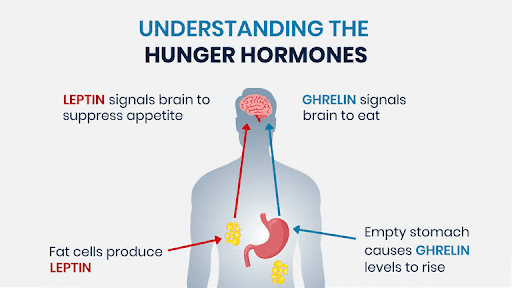
Understanding Role and the Impact of Gastric Sleeve Surgery On Hunger Hormone Ghrelin:
Last Updated on April 1, 2024
Are you thinking about gastric sleeve surgery for weight loss?
If so, then you need to get acquainted with Ghrelin – the ‘hunger hormone.’
This crafty hormone is the maestro of your appetite, conducting the symphony of your hunger signals.
By knowing Ghrelin’s game, and how gastric sleeve puts it in check, you’ll see the potential powerhouse that sleeve surgery can be in getting your weight back in check.
Let’s dive into Ghrelin’s role, its rise and fall, its regulation, and how gastric sleeve surgery plays a game-changing role.
Ready to crack the Ghrelin code? Read on!
Scroll down to learn more about:
- What’s known about how Ghrelin works
- Is Ghrelin a cause of obesity?
- How does gastric sleeve surgery affect Ghrelin?

What we know about the hunger hormone ghrelin?
Ghrelin, often referred to as the “hunger hormone,” is a peptide hormone primarily produced in the stomach.
It’s a crafty hormone that calls the shots when it comes to appetite and sending hunger signals in the body.
💡 The discovery of Ghrelin in 1999 by Masayasu Kojima, Kenji Kangawa, and colleagues has significantly contributed to our understanding of the complex mechanisms involved in hunger and satiety.
Produced mainly in your stomach, it’s the puppet master behind hunger signals, pushing the “FEED ME” button before meals, and the “FULL” switch afterwards.
The production of Ghrelin is primarily controlled by specialized cells in the lining of the stomach called enteroendocrine cells. These cells release Ghrelin into the bloodstream in response to signals from the hypothalamus (an area of the brain that produces hormones that controls body temperature, heart rate, hunger, etc.) and other parts of the body.
Ghrelin acts on specific receptors in the hypothalamus, influencing appetite and food intake.
⬆️ Ghrelin levels tend to rise before meals, signalling hunger to the brain and stimulating the desire to eat.
⬇️ Conversely, after eating, Ghrelin levels decrease, contributing to the feeling of satiety.
This intricate regulation of Ghrelin production and release is influenced by various factors, including the time of day, sleep patterns, stress levels, and nutritional status.
Interestingly, Ghrelin “moonlights” in energy balance and weight management, making it a cornerstone in your body’s nutritional theatre.
Also read: Why diets don’t work.
Is the hunger hormone Ghrelin a cause of obesity?
Based on the information we have laid out above, you might have made the assumption that Ghrelin levels are higher in people who are overweight or obese.
But surprisingly this is not the case.
A study published by the International Institute of Anticancer Research showed that Ghrelin levels are usually lower in people who have a higher body weight compared to those with a normal body mass index (BMI).
This suggests that Ghrelin is not a cause of obesity. However, there is some research to suggest that people who are of a higher weight may actually be more sensitive to the hunger hormone which could account for why you may feel hungry even if you have lower levels of the ghrelin.
Do Ghrelin levels decrease after dieting?
A common question that people have about Ghrelin is whether it decreases after dieting.
| The short answer is no.
Another surprising fact about the hunger hormone is that Ghrelin levels actually increase after dieting. If you’ve ever struggled to maintain the weight you’ve lost through dieting this hormone is partially to blame. |
This increase is believed to be a survival mechanism of the body to stimulate hunger and try to regain the lost weight, contributing to what is commonly referred to as “yo-yo dieting.” This physiological response is one of the reasons why maintaining weight loss can be such a challenge for many people. The effect on Ghrelin levels is one of the reasons why surgical interventions like the gastric sleeve, which affects Ghrelin production, can be effective for long-term weight loss.
Also read: Bariatric Surgery 101 – Everything You Need to Know
In what ways does Ghrelin impact your body?
In addition to its role in appetite regulation, Ghrelin has been found to have effects on other physiological processes.
It can influence gastric motility, resulting in food emptying from your stomach more quickly.
Ghrelin also interacts with the reward centres of the brain, potentially contributing to the pleasurable aspects of eating.
Moreover, Ghrelin has been implicated in the regulation of glucose metabolism, insulin secretion, and cardiovascular function.
Unravelling the role of Ghrelin, the hunger hormone, has given us powerful insights into the intricate dance between gut, brain and hormones in orchestrating our hunger signals and energy balance.
Researchers have been investigating ways to modulate Ghrelin levels or its interaction with receptors to develop novel treatments for obesity, eating disorders, and metabolic conditions.
This knowledge has paved the way for innovative approaches to tackling weight-related issues and has contributed to the development of bariatric procedures like gastric sleeve surgery that can impact Ghrelin levels and aid in long-term weight management.
| By altering the physical structure of the stomach – where Ghrelin is produced – sleeve surgery naturally modulates Ghrelin levels, ultimately helping to regulate appetite and manage weight. Hence, it’s not just a surgical intervention, it’s a hormonal one, taking on obesity at its root. |
Also read: How to manage your hunger and cravings
How does gastric sleeve surgery affect the hunger hormone Ghrelin?
Sleeve gastrectomy, or gastric sleeve surgery, is a game-changer in the battle against obesity.
It’s not just a size change – we’re shrinking the stomach to a sleeve-like shape – but also a hormonal shift.
As most of the hunger hormone Ghrelin is produced in the stomach’s upper part, the fundus, reducing the stomach size significantly cuts down Ghrelin production. Lower Ghrelin levels reduce the desire to eat and cravings for food, making this surgery a powerful ally in your weight loss journey.
Research studies have consistently shown that gastric sleeve surgery leads to a substantial decrease in Ghrelin levels. For example, a study from the Faculty of Medicine, University of Ostrava, Ostrava, Czech Republic showed that plasma levels of fasting Glucose, Leptin and Ghrelin were significantly decreased in patients 12 months after gastric sleeve surgery.
This reduction in Ghrelin is believed to play a significant role in the post-surgical changes in appetite and satiety experienced by patients who undergo the procedure.
The decrease in Ghrelin levels after gastric sleeve surgery contributes to reduced feelings of hunger and a decreased appetite. Patients often report a significant decline in their cravings and an increased sense of fullness after consuming smaller meals.
This change in appetite regulation is beneficial for long-term weight management as it helps individuals adhere to healthier eating habits and portion control.
It is important to note that the decrease in Ghrelin levels following gastric sleeve surgery is not the sole factor responsible for the surgery’s success in promoting weight loss.
The procedure also involves the removal of a substantial portion of the stomach, resulting in a smaller stomach capacity. This restriction on the amount of food that can be consumed contributes to a calorie deficit, leading to weight loss.
However, the impact of gastric sleeve surgery on Ghrelin levels goes beyond appetite control and weight loss.
Studies have indicated that the reduction in Ghrelin may have additional metabolic benefits. Lower Ghrelin levels post-surgery have been associated with improved glucose metabolism, insulin sensitivity, and a decrease in cardiovascular risk factors.
Although gastric sleeve surgery significantly reduces Ghrelin levels, it is important to recognize that Ghrelin is not the sole hormone responsible for appetite regulation. There are other hormones and complex neural pathways involved in the intricate interplay between hunger and satiety.
Gastric sleeve surgery affects multiple factors contributing to weight regulation, and the decrease in Ghrelin is just one piece of the puzzle.
Calculate Your Gastric Sleeve Weight Loss Now
How quickly will the gastric sleeve reduce my appetite?
On of the key benefits of gastric sleeve surgery is its ability to reduce appetite and control food intake.
After undergoing the procedure, many individuals experience a significant decrease in their appetite, which plays a crucial role in achieving successful weight loss and long-term weight management.
The reduction in appetite following gastric sleeve surgery can vary from person to person, and the timeframe for experiencing this change may differ. However, in general, patients typically notice a noticeable decrease in their appetite immediately, or within the first few days following surgery.
In the immediate post-operative period, the body undergoes a healing process, and the focus is primarily on following the prescribed dietary guidelines provided by the medical team. During this time, the appetite may be reduced due to factors such as the smaller stomach size, the healing process, and the adaptation to the new eating habits.
As the recovery progresses, usually within the first few weeks, patients start to notice a significant difference in their appetite. They often report feeling full with smaller amounts of food, and the intense hunger pangs and cravings that were present before surgery are dramatically reduced or no longer even present. This reduction in appetite is a result of both the physical changes in the stomach’s size and the hormonal changes, including the decrease in Ghrelin levels.
One of the number one things The Sleeve Clinic patients tell us is that if they didn’t set an alarm clock they wouldn’t remember to eat.
It is important to note that while the appetite is reduced, it is still essential for patients to follow the recommended post-operative dietary guidelines to ensure proper nutrition and weight loss. These guidelines typically involve consuming smaller, protein-dense meals.
This is one of the reasons The Sleeve Clinic has a 5 Year Aftercare program – to ensure that patients stay on track and have the support and tools they need to manage their long-term nutrition.
Patients often find that their appetite reaches a new, lower baseline, making it easier to control portion sizes and make healthier food choices. This enhanced appetite control is crucial for long-term weight management and the maintenance of weight loss.
Also Read – Does Gastric Sleeve Affect Pregnancy? Understanding the Impact and Considerations
In Conclusion: Is Sleeve Surgery Right For You?
In the end, your weight loss journey is deeply personal.
Understanding Ghrelin – the hunger hormone – is a key piece to the puzzle.
This knowledge reveals the biological side of your battle, helping you comprehend why past diets may have faltered. Gastric sleeve surgery could be your powerful ally, curbing Ghrelin and hunger pangs.
Armed with this information, you’re one step closer to making an informed choice, guided by science.
If you’re considering weight loss surgery, below are some next steps you can take:
- Take a quick online quiz to see if you qualify for sleeve surgery
- Request to Join the Sleeve Clinic’s Private Facebook Group
- Speak with a Sleeve Clinic Program Advisor
- Follow The Sleeve Clinic on Instagram
Please note that the information provided in this article is for general informational purposes only and should not replace medical advice. It is always recommended to consult with a qualified healthcare professional for personalized guidance regarding weight loss surgery in Toronto. If you are considering sleeve surgery you can book a consultation with our clinic here: Contact us!






